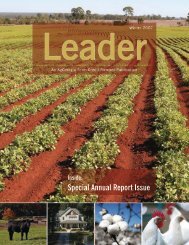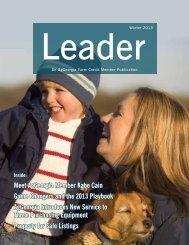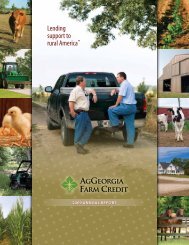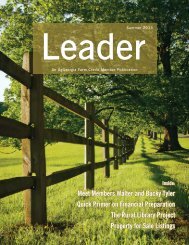AgGeorgia Farm Credit
AgGeorgia Farm Credit
AgGeorgia Farm Credit
- No tags were found...
You also want an ePaper? Increase the reach of your titles
YUMPU automatically turns print PDFs into web optimized ePapers that Google loves.
Agriculture in the Next DecadeBy Dr. David M. KohlDr. Dave KohlIt is not often one gets to return to their almamater to be part of a distinguished panel toaddress the future of agriculture and ruralAmerica. Cornell University, in Ithaca, N.Y.,overlooking Cayuga Lake, one of the FingerLakes, was the backdrop for this production. Ispent three years and six months here earningmy master’s and doctorate degrees. I sharedthe panel with Dr. Kathryn Boor, Dean ofthe College of Agriculture and Life Sciences,and Mr. Chuck Connor, President and CEOof the National Council of <strong>Farm</strong>er Cooperatives.The panel was moderated by one of myformer classmates, Mr. Bill Lipinski, CEO of<strong>Farm</strong> <strong>Credit</strong> East. Let us explore some of thethoughts and perspectives shared that day.The Agricultural MarketplaceFirst, the food, fiber, and fuel marketplacewill undergo more change in the next 10 yearsthan it has in the past 50. Local, natural andorganic agriculture will be a growing segmentof the market, particularly in the populationbelts of the eastern part of the United Statesextending into Canada, where nearly 40percent of the affluent population is located.Globally, the emerging marketplacewill present tremendous opportunitiesfor producers in the food, fiber and fuelbusinesses. The key will be to deliver productsto a global populace, in which 27 percent liveon less than a dollar per day and another 20percent live on less than two dollars perday. It was the consensus of the panel thatthe U.S. agricultural industry needs to morefully understand global emerging trends andthe needs of diverse cultures in regions withgrowing populations.Consumer RelationsThe panel was in agreement that more timewill be needed with government agenciesand the public sector going forward. With 85percent of Americans two generations awayfrom the farm, connecting with consumersconcerning market trends, and social andnatural resource issues needs to be a highpriority for any individual or group linkedto agriculture. Understanding the emotional“hot buttons” of the public and developingproactive, fact-based, educational responseprograms are going to be critical to garnersupport. More time will be spent across thespectrum with local, state, national, and internationalgovernment agencies and centersgiven these challenges. One must be engagedwith consumers and be an advocate for theagricultural industry.The panel was asked how risk in theagricultural industry has changed. Volatilityat the extremes in market dynamics, thatbeing cost, revenue, and bottom line net profit,was the most frequent response. Volatilitywill create more opportunity for success, butit also comes with more opportunity to fail.Success in AgricultureThis leads to the final issue of how one cansucceed in agriculture in the next 10 years.Regardless of the agricultural endeavor, beingassociated with the right people and havingeffective “people skills” will be essential.Networking with others and establishingcustomer advisory groups in the business willbe critical to connect with the marketplaceand people outside of agriculture. Internally,advisory groups can bring expertise and acritical eye to business strategies that ensurethe operation stays on course, ensuringa profitable, sustainable business and arewarding lifestyle.Preserving flexibility in businessstrategies and maintaining proper levelsof financial debt and working capital willassist in navigating through the downturnsof economic cycles. This will also allow thebusiness to “hit the ground running” whenopportunities arise on the other side of adownturn. These strategies apply regardlessof business size, enterprise or location.All the panelists were bullish on thenext decade for the agriculture industry andthe opportunities it will present, not onlyfor business, but for a lifestyle that can bea foundation for strong family values andeducation of our youth. zDavid Kohl received his M.S. and Ph.D.degrees in Agricultural Economics fromCornell University. For 25 years, Kohlwas Professor of Agricultural Finance andSmall Business Management and Entrepreneurshipin the Department of Agriculturaland Applied Economics at Virginia Tech,Blacksburg, Va. He was on special leavewith the Royal Bank of Canada working onadvanced initiatives for two years, and alsoassisted in the launch of the successful entrepreneurshipprogram at Cornell University.Kohl is Professor Emeritus in the AAECDepartment at Virginia Tech.<strong>AgGeorgia</strong>.18.Autumn 2012










